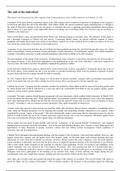The cult of the individual
This speech was delivered to the 20th congress of the Communist party of the USSR in Moscow on February 25 1956
Comrades! In the party central committee's report at the 20th congress and in a number of speeches by delegates to the congress a
lot has been said about the cult of the individual. After Stalin's death, the central committee began explaining that it is foreign to
the spirit of Marxism-Leninism to elevate one person, to transform him into a superman possessing supernatural characteristics,
akin to those of a god. Such a man supposedly knows everything, sees everything, thinks for everyone, can do anything, is
infallible in his behaviour.
Such a belief about a man, and specifically about Stalin, was cultivated among us for many years. The objective of this report is
not a thorough evaluation of Stalin's life and activity. Concerning Stalin's merits, an entirely sufficient number of books,
pamphlets and studies had already been written in his lifetime. Stalin's role in the execution of the socialist revolution, in the civil
war, and in the construction of socialism is universally known.
At present, we are concerned with how the cult of Stalin has been gradually growing, the cult which became the source of a whole
series of exceedingly serious perversions of party principles, of party democracy, of revolutionary legality. The central committee
considers it absolutely necessary to make material pertaining to this matter available to the 20th congress.
The great modesty of the genius of the revolution, Vladimir Ilyich Lenin, is known. Lenin always stressed the role of the people as
the creator of history. Lenin mercilessly stigmatised every manifestation of the cult of the individual. Lenin never imposed his
views by force. He tried to convince. He patiently explained his opinions to others.
Lenin detected in Stalin those negative characteristics which resulted later in grave consequences. Fearing the future fate of the of
the Soviet nation, Lenin pointed out that it was necessary to consider transferring Stalin from the position of general secretary
because Stalin did not have a proper attitude toward his comrades.
In 1922 Vladimir Ilyich wrote: "After taking over the position of general secretary, comrade Stalin accumulated immeasurable
power in his hands and I am not certain whether he will be always able to use this power with the required care."
Vladimir Ilyich said: "I propose that the comrades consider the method by which Stalin would be removed from this position and
by which another man would be selected for it, a man who, above all, would differ from Stalin in only one quality, namely, greater
tolerance, greater loyalty, greater kindness."
Comrades! The party congress should become acquainted with new documents, which confirm Stalin's character. In March 1923,
Lenin sent Stalin the following letter: "Dear comrade Stalin! You permitted yourself a rude summons of my wife to the telephone
and a rude reprimand of her. Despite the fact that she told you that she agreed to forget what was said, I have no intention to forget
so easily." Comrades! I will not comment on these documents. They speak eloquently for themselves.
As later events have proven, Lenin's anxiety was justified. Stalin, who absolutely did not tolerate collegiality in leadership and in
work, acted not through persuasion, but by imposing his concepts and demanding absolute submission to his opinion. Stalin
originated the concept "enemy of the people". This term automatically made it unnecessary that the ideological errors of a man be
proven. It made possible the use of the cruellest repression, against anyone who in any way disagreed with Stalin, against those
who were only suspected of hostile intent, against those who had bad reputations.
On the whole, the only proof of guilt actually used was the "confession" of the accused himself. "Confessions" were acquired
through physical pressures. Innocent individuals - who in the past had defended the party line - became victims. Mass arrests and
deportations of many thousands of people, execution without trial and without normal investigation created conditions of
insecurity, fear and even desperation.
Vladimir Ilyich demanded uncompromising dealings with the enemies of the revolution. Lenin used such methods, however, only
against actual class enemies and not against those who blunder. Stalin, on the other hand, used extreme methods and mass
repressions at a time when the revolution was already victorious. During Lenin's life, party congresses were convened regularly.
Lenin considered it absolutely necessary that the party discuss at length all questions bearing on the development of government.
After Lenin's death, Stalin trampled on the principle of collective party leadership. Of the 139 members and candidates of the
central committee who were elected at the 17th congress, 98 persons, 70%, were arrested and shot. It is inconceivable that a
congress so composed could have elected a central committee in which a majority would prove to be enemies of the party.
Delegates were active participants in the building of our socialist state; many of them suffered and fought during the pre-
revolutionary years; they fought their enemies valiantly and often nervelessly looked into the face of death.
How, then, can we believe that such people had joined the camps of the enemies of socialism? This was the result of the abuse of
power by Stalin. On the evening of December 1 1934 on Stalin's initiative, the secretary of the presidium signed the following





